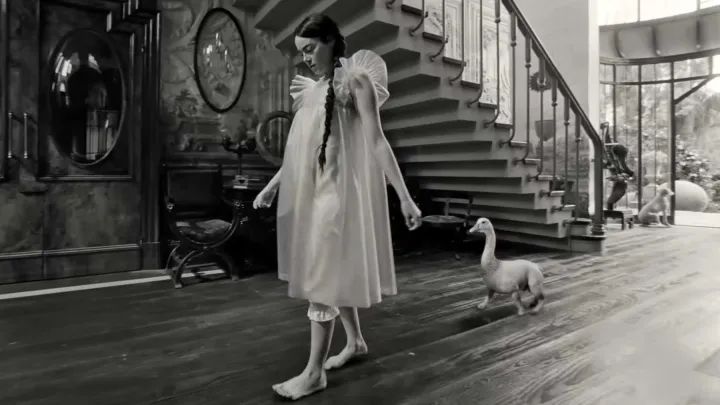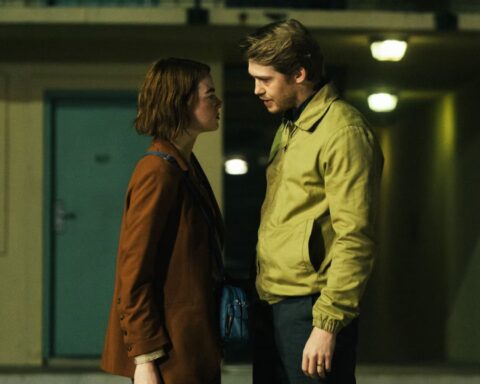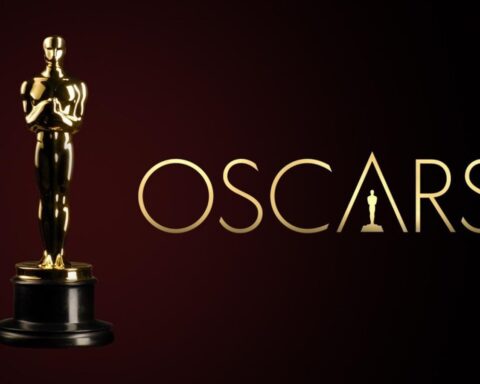Any film that combines the talents of Emma Stone and acclaimed director, Yorgos Lanthimos, is likely to get your average cinephile excited. Throw in Willem Dafoe, Mark Ruffalo, and an eccentric story riffing on the classic tale of Frankenstein, and you have a film that absolutely demands the attention of anyone who has a penchant for the peculiar. Despite all the expectations resting on its shoulders, Poor Things lives up to the hype and then some, as Lanthimos delivers another bizarre, brilliant, and very twisted comedy movie; one which excels in every aspect of filmmaking and shows all the signs of a director who continues to push the boundaries of storytelling with his lofty ambitions and provocative concepts.
Based on the novel of the same name by Alasdair Gray, Poor Things is the story of Bella Baxter (Stone), a young woman who is not quite what she seems. As the subject of a wild scientific experiment by Doctor Godwin Baxter (Dafoe), Bella knows only of the world what her father/creator teaches her. That is until the introduction of two men—medical student Max McCandles (Ramy Youssef) and lawyer Duncan Wedderburn (Ruffalo)—changes the trajectory of Bella’s life as she embarks on a globetrotting journey of self-discovery and learns more about the horrors and the simple pleasures the world has to offer.

Emma Stone is something of an awards darling already, and her role in Poor Things has brought much acclaim her way once more, including her latest win at the Golden Globes. In the opening 20 minutes or so, as Bella displays childlike, simple behaviors, it can be hard to imagine why so much praise has been bestowed upon Stone, but as her character evolves through the course of the film, the actor truly flourishes. Imbued with a wider vocabulary, a greater sense of her environment, and a stronger desire for self-preservation, Stone quite literally transforms, projecting a spellbinding aura powered by pragmatism and empowerment.
The acting ensemble in support is phenomenal, too. Ruffalo puts his comedic chops to work sublimely and proves he is just as adept at delivering slapstick humor as he is when working on more dramatic projects. His portrayal of the lothario Wedderburn is laced with sleaze and false charm, but underpinning it all is a more desperate, pathetic petulance, which he simply cannot contain with every profane (and hilarious) outburst. Dafoe, too, brings a dry wit and an oddly endearing appeal to the role of Godwin, or God, for short. The esteemed actor clearly thrives when he is allowed to unleash his weird side, and his chemistry with the far more unsuspecting and innocent Youssef provides us with a genuinely captivating odd couple.
It is clear that everyone involved in this project had a hell of a lot of fun making this picture, and it’s hardly surprising given the playful nature of the narrative and the world we are immersed in. Writer Tony McNamara—who also collaborated with Lanthimos on The Favourite—does a magnificent job of translating the surrealist work of Alasdair Gray for the big screen. Of course, the story draws parallels with Mary Shelley’s iconic piece of literature, and there is a healthy dose of inspiration from the legendary Fritz Lang film, Metropolis, too, but Poor Things still feels wonderfully unique and vibrant enough to stand on its own merit.
The worldbuilding involved in telling this expansive story is beautifully and masterfully done. From the steampunk streets of Victorian London to the mesmerizing high seas and decadent cruise liner, through an apocalyptic Alexandria, all the way to the sordid underworld of the Parisian red light district, Poor Things conjures up a fantastically distorted experience for both Bella and the audience, to the extent it becomes hard to even pin down the temporal context of the film, in a manner befitting the greatest science fiction stories.

This is all down to the meticulous attention to detail and mind-blowing work across all the technical departments involved in the production. The set design is imaginative and truly helps to augment the disorientating adventure, but it is costume designer Holly Waddington who perhaps deserves the most credit. Bella’s wardrobe is experimental and outrageous, with sharp lines, frilly details, and flesh-revealing cuts throughout, all serving to highlight her role as the anomaly in polite society. Cinematographer Robbie Ryan—whose previous credits include more gritty, realism pieces from the likes of Mike Mills and Ken Loach—produces absolutely stunning visuals here, with a combination of gothic monochrome and radiant technicolor blurring the lines between dream and nightmare. Ryan also relies on the use of the fish-eye lens and a peephole lens, much like he did with The Favourite, though this effect can be quite jarring at times. A special shoutout should also go to the title cards used in the film, which offer some of the most fascinating visuals of all.
The humor largely leans on visual gags, eroticism, and brutal putdowns, and while it does work most of the time, there will certainly be moments that don’t land for everyone. Put it this way, if you thought Saltburn was a weird film, you definitely do not want to watch Poor Things with your nearest and dearest. Bella’s journey teaches her plenty about society, but her sexual experimentation and empowerment becomes a prominent theme throughout, and is not the kind of content the more prudish viewer would appreciate, that’s for sure.
Far from being risque for the sake of simple shock value, though, Poor Things is a deeply profound story, offering a brilliant twist on the Frankenstein archetype. The clash between deep-rooted patriarchy and Bella’s blossoming feminist outlook is an intriguing examination of the role of sex in society. But it is Bella’s evolution, the way she grapples with her own complex identity that offers the most captivating element of the story. She is a being who shrugs off the whims of the world around her, taking what she wants and speaking her mind in a way that most of us can only dream of, and becomes a character you cannot help but root for.
Poor Things is so thematically rich that it demands repeat viewings. Yorgos Lanthimos’ body of work is full of thought-provoking societal studies, but this is perhaps his most explorative and clinical dissemination of the world around us to date. It is certainly his most visually experimental picture, too; a film that at the very least stimulates the senses and, at its highest points, stirs the mind and soul of the viewer.





